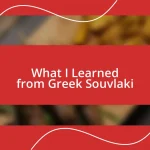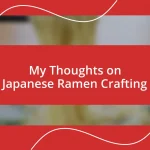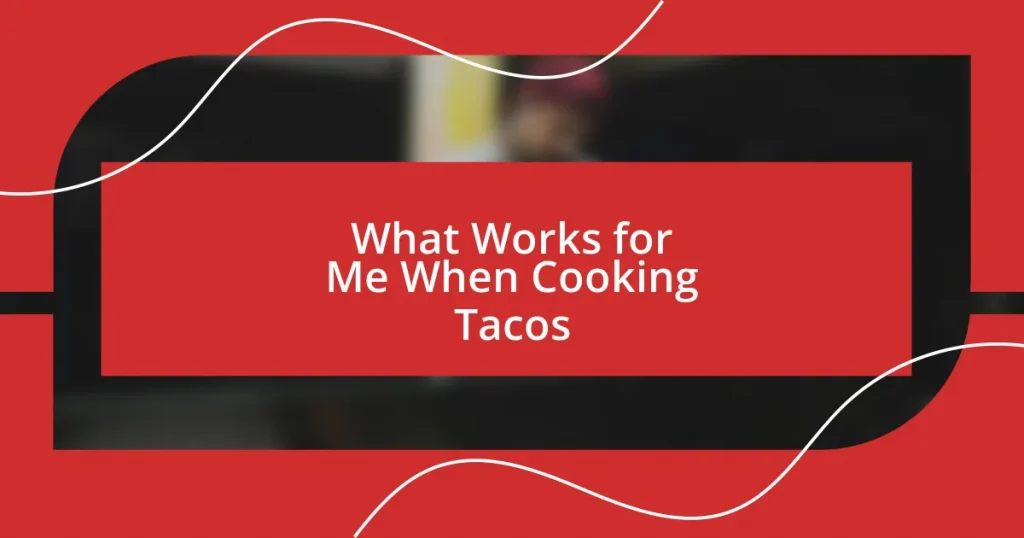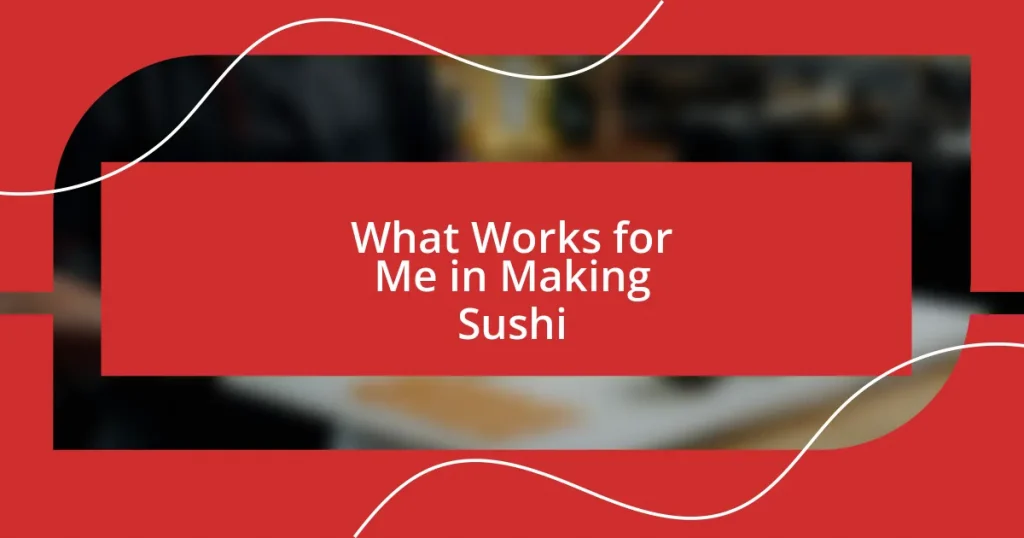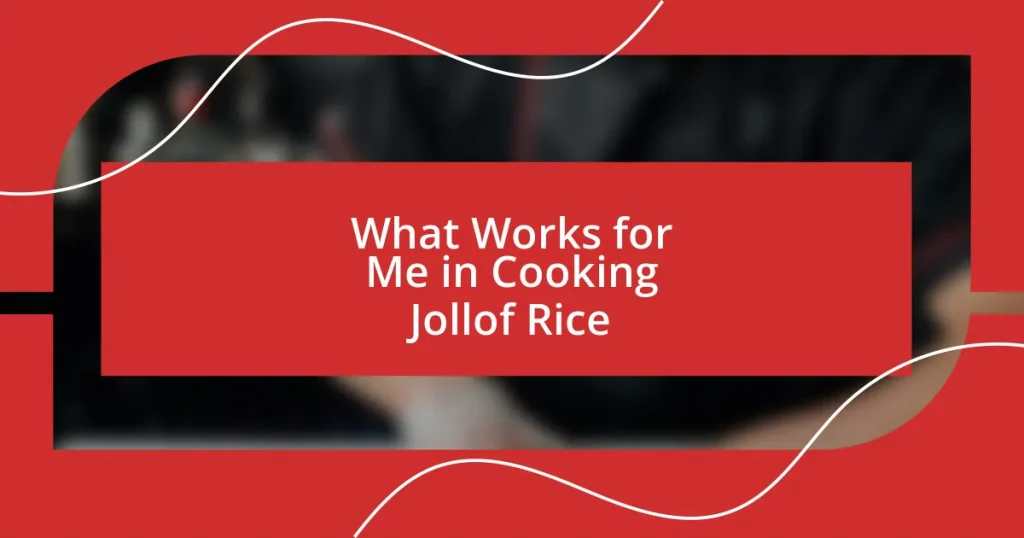Key takeaways:
- Cooking became a form of creative expression and therapy, providing joy and stress relief through the process of making food.
- Experimenting with recipes and exploring different cooking styles revealed the cultural significance of food, enhancing appreciation for culinary diversity.
- Joining cooking communities fostered connections and collaborative learning, transforming cooking from a solitary task into a shared experience filled with excitement and support.

Discovering a love for cooking
I still remember the first time I stood in front of a stovetop, clumsily chopping vegetables for a stir-fry. The smell of garlic sizzling in the pan was intoxicating and made my heart race with excitement. It struck me then that cooking wasn’t just about feeding myself; it was a way to express creativity and showcase love through food.
As I experimented with different recipes, each dish became a canvas where I could unleash my imagination. Who hasn’t felt that overwhelming joy when your creation turns out just right? I recall a particularly challenging cake that I spent hours perfecting, and the moment I pulled it out of the oven—golden brown and perfectly risen—I couldn’t help but beam with pride. It was in those small victories that I found a deep-seated joy in cooking, something I hadn’t anticipated when I first ventured into the kitchen.
Could it be that cooking is a form of therapy? For me, whisking together ingredients became a meditative process, each stirring motion melting away the stress of the day. The act of transforming raw ingredients into something delicious not only filled my belly but also nourished my spirit in ways I never expected.

Finding motivation to cook
Finding the motivation to cook can often come from the simplest of inspirations. I remember scrolling through social media one evening, stumbling upon a captivating food video that had me drooling. The colors, the sounds, and the sheer joy of cooking radiated from the screen. That sparked a fire in me, compelling me to recreate that dish in my own kitchen. Suddenly, cooking became not just a task but an exciting challenge that I was eager to tackle.
If you’re looking for ways to ignite your cooking passion, consider these motivating factors:
- Explore diverse cuisines through cookbooks or online blogs to broaden your horizons.
- Set a weekly cooking challenge with friends to make it social and fun.
- Create a personal vision board of meals you want to try, making your goals visual and tangible.
- Reflect on childhood memories that involve cooking, as nostalgia can be a powerful motivator.
- Join cooking classes to enhance your skills while gaining encouragement from like-minded individuals.
Drawing from these experiences and ideas can transform cooking from a chore into a beloved hobby.
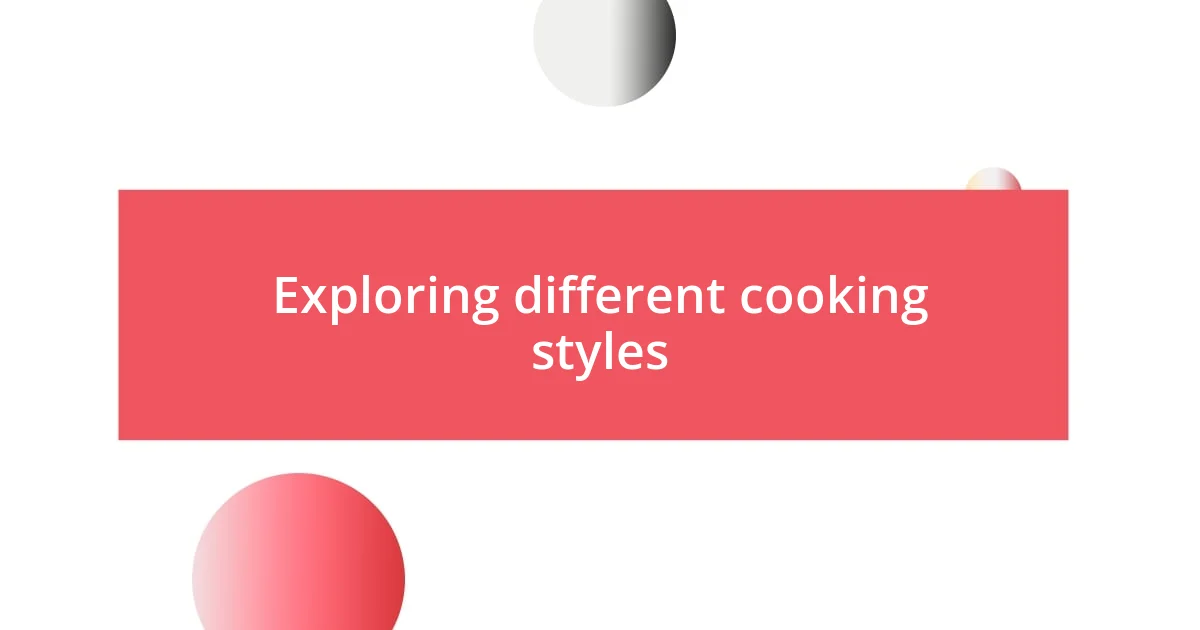
Exploring different cooking styles
Exploring various cooking styles has been an exciting journey for me. One of my first encounters was with Italian cuisine, where I fell in love with homemade pasta. I remember spending a whole Sunday experimenting with flour and eggs, creating pasta shapes and sauces from scratch. The process was messy but so satisfying, and the end result was a delicious meal that I proudly shared with my friends.
As I delved deeper into my culinary exploration, I found Asian cooking to be incredibly fascinating. The art of balancing flavors—sweet, salty, sour, and savory—was a delightful challenge. One evening, I tried my hand at making sushi for the first time, laying out fresh fish and rice with an eager sense of adventure. I didn’t get it perfect on the first try, but that didn’t matter; I learned so much from that experience, and it fueled my desire to refine my skills in the kitchen.
Comparing different cooking styles reveals how each culture showcases its history and values through food. For instance, while Italian cooking emphasizes simplicity and fresh ingredients, Indian cuisine showcases a tapestry of spices and complex flavors. This realization opened my eyes to the rich stories told through dishes, encouraging me to embrace the diversity of cooking styles as I continue my culinary journey.
| Cooking Style | Key Characteristics |
|---|---|
| Italian | Simplicity, fresh ingredients, emphasis on pasta and olive oil |
| Indian | Rich use of spices, layered flavors, variety of regional dishes |
| Japanese | Focus on presentation, seasonal ingredients, balance of flavors |
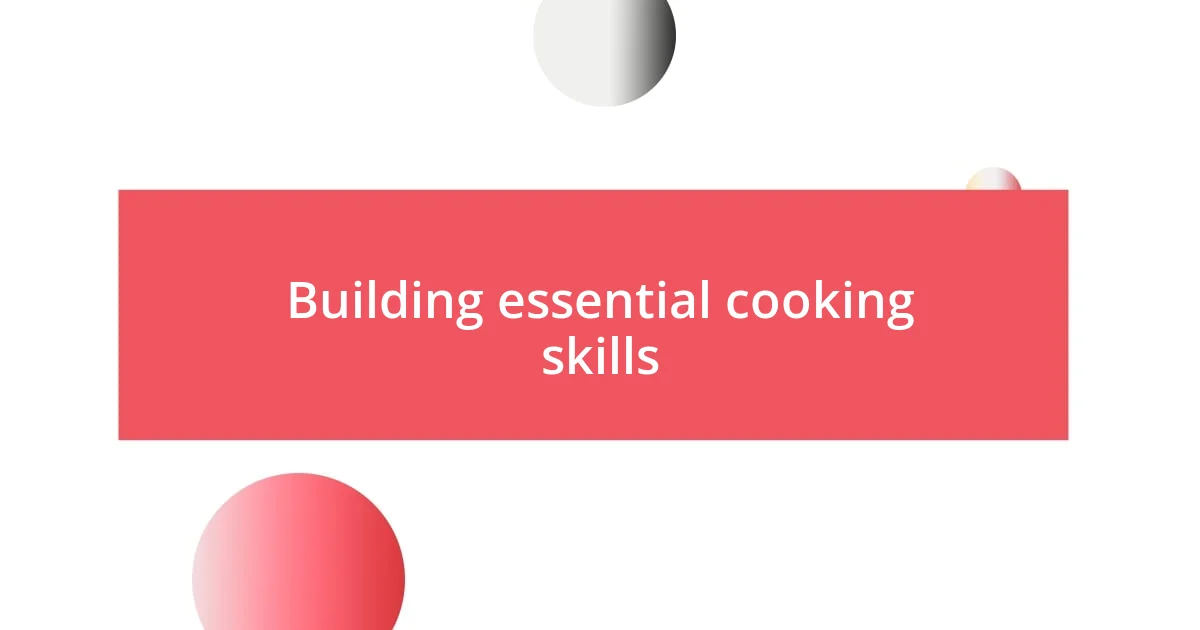
Building essential cooking skills
Building essential cooking skills has been a transformative experience for me, filled with both triumphs and lessons. I recall my first time attempting to chop vegetables; the knife felt foreign in my hands, and I was terrified of cutting myself. But with practice, each slice became more confident, and I took pride in my newfound ability to prep ingredients quickly. What skills did I want to build next? I decided to focus on mastering knife techniques, which opened up a whole new world of culinary possibilities.
Embracing the basics was crucial for my growth as a home cook. I remember the day I tackled making a classic French omelette. With just eggs, butter, and a pinch of salt, it felt daunting yet rewarding. Achieving the perfect texture was a delicate dance of heat and timing, and I realized that even simple dishes require a level of skill and attention. This experience taught me that cooking is not just about following recipes—it’s about developing a feel for flavors and techniques.
As I explored more advanced skills, I found that understanding flavor profiles became my secret weapon. I can’t forget my first attempt at making a curry from scratch. It involved balancing spices, which felt overwhelming at first. However, as I experimented with different combinations, I discovered how each spice contributed to the overall dish. That realization was exhilarating! It made me question how many other flavor combinations I had yet to discover. This journey of building essential skills has truly made me appreciate the art of cooking on a deeper level.
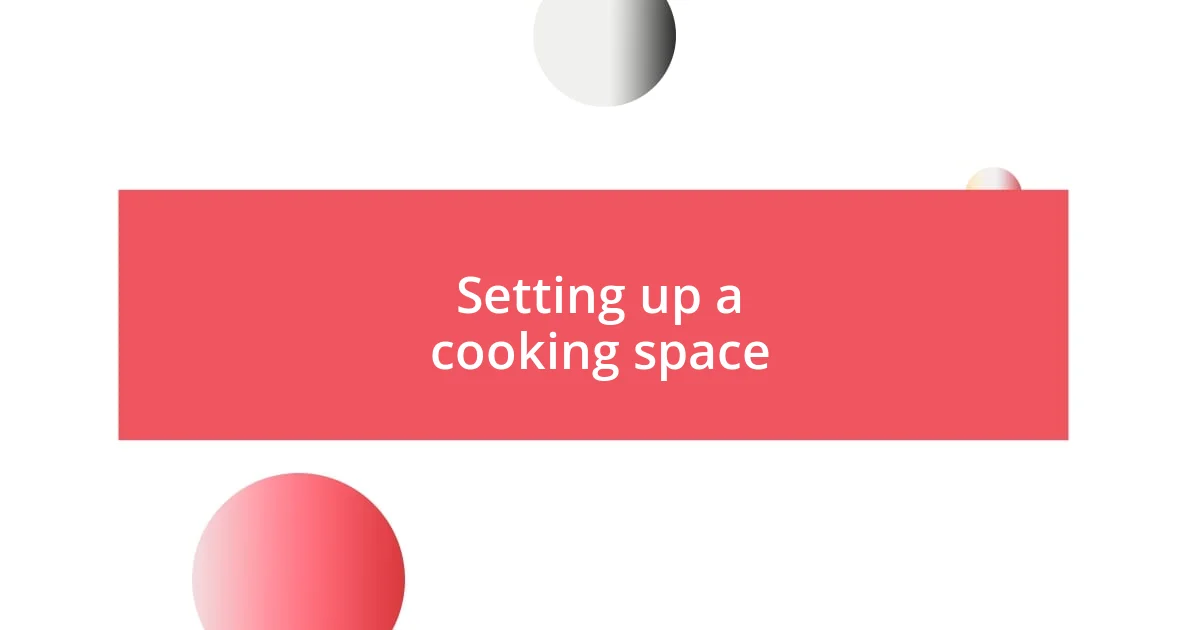
Setting up a cooking space
Creating a dedicated cooking space has dramatically enhanced my culinary adventures. I remember when I set aside a corner of my kitchen for this purpose—it felt exhilarating! I installed a sturdy cutting board and organized my knives and utensils within easy reach. This simple act transformed my cooking routine, making it feel more intentional and less chaotic.
As I shaped my cooking space, I also made it aesthetically pleasing. I found that hanging herbs in pots not only added a splash of color but also brought fresh ingredients closer at hand. And let me tell you, there’s something about having fresh basil within arm’s reach that makes me feel like a real chef! Do you agree that a beautiful environment can make a huge difference in the cooking experience?
Lighting played a crucial role, too. I experimented with options—some bright for precision tasks, and others soft for those cozy, evening dinner preparations. This balance helped create a welcoming space that encouraged creativity. Each element that I added—from my favorite cookbooks on display to a few personal touches—has made cooking a joyful escape rather than just a chore.

Experimenting with recipes
Experimenting with recipes has been one of the most thrilling aspects of my cooking journey. I remember the first time I decided to alter a family recipe—my grandmother’s lasagna. I swapped out the traditional meat sauce for a roasted vegetable medley. As I layered those vibrant veggies between the noodles, I felt a rush of excitement, wondering if my family would embrace the change or turn their noses up at it. To my surprise, they loved it, and that moment ignited a passion for experimentation in my kitchen.
One of the most delightful experiments I’ve conducted involved baking—specifically, chocolate chip cookies. I once decided to try a new twist by adding a sprinkle of sea salt on top before baking. The result was a mouthwatering contrast of sweet and salty, elevating a simple cookie to something extraordinary. Have you ever added an unexpected ingredient to a recipe? It can lead to discoveries that make you feel like a culinary genius! Each minor tweak revealed how fun and rewarding it is to trust my instincts.
I’ve also learned that successful experimentation hinges on a fearless attitude. There have been times when my attempts didn’t go as planned—like the time I tried infusing my own olive oil with rosemary. Instead of a fragrant enhancement, I ended up with a bitter concoction that was barely edible. But rather than feeling defeated, I took it as a lesson learned. Every misstep has taught me more about flavors and techniques, pushing me to keep experimenting boldly. Isn’t it fascinating how even the “fails” can turn into opportunities for growth?
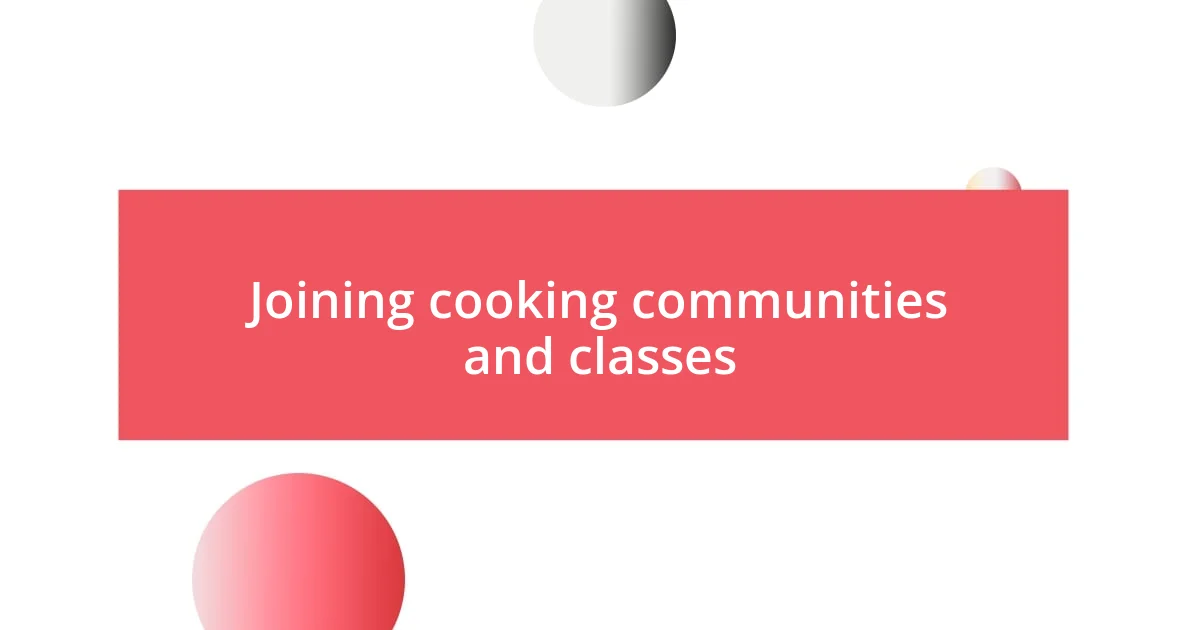
Joining cooking communities and classes
Joining cooking communities and classes has been a transformative experience for me as I’ve ventured deeper into my culinary journey. I remember signing up for a local cooking class, feeling both excited and intimidated. The warmth and camaraderie of fellow food lovers created an instant connection. It was enlightening to share my triumphs and mishaps in the kitchen with others, and I quickly learned that many of them had faced similar challenges. Have you ever felt that sense of belonging in a new group? It’s empowering!
Engaging with a cooking community has opened my eyes to new cuisines and techniques. I recall attending a virtual cooking session where we explored the nuances of Thai cooking. As we diced fresh herbs and stirred fragrant sauces together online, I could feel the energy of everyone’s passion for food. It was thrilling to witness how our individual dishes took shape, all inspired by the same recipe, yet bursting with unique flavors. In that moment, I realized how much I had grown just by participating in these shared experiences.
Moreover, these communities often foster collaboration over competition. I vividly remember a potluck where each participant brought their own dish to share. The excitement of tasting everyone’s creations and exchanging recipes made me appreciate cooking as a communal act. What’s better than enjoying a meal alongside friends who share the same enthusiasm? It was a reminder that cooking isn’t just about perfecting techniques; it’s also about building connections and celebrating the joy of food together.




